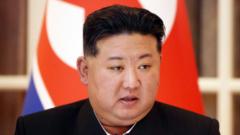North Korean state media has reported that leader Kim Jong Un supervised the successful test launch of two new air defense missiles, showcasing their "superior combat capability" and employing "unique technology." The Korean Central News Agency (KCNA) described the launches as a demonstration of the projectiles' effectiveness against aerial threats, such as drones and cruise missiles.
This missile test comes in the wake of South Korea confirming it fired warning shots after approximately 30 North Korean soldiers briefly crossed the highly fortified Demilitarized Zone (DMZ) separating the two Koreas. In reaction, Pyongyang accused Seoul of engaging in "deliberate provocation."
Tensions in the region have been exacerbated during the ongoing large-scale joint military exercises conducted by South Korea and the United States. US President Donald Trump is scheduled to meet with South Korea's newly-elected President Lee Jae Myung, who advocated for enhanced inter-Korean relations. However, efforts towards reconciliation have been rebuffed by Kim’s sister, indicating deepening divides.
Kim Jong Un has publicly condemned the US and South Korea's military maneuvers, labeling them as "most hostile and confrontational," and reaffirmed his commitment to rapidly expand North Korea's nuclear arsenal. This follows January's announcement of a missile launch involving a hypersonic warhead aimed at countering perceived rivals in the Pacific.
Concerns have also been raised regarding potential collaboration between North Korea and Russia, particularly in light of investigations suggesting that Russia may have provided missile technology and military resources to assist North Korean defenses.
As one of the world’s most restrictive regimes, North Korea has been ruled by Kim and his family for generations. The Korean Peninsula remains divided since the 1953 Korean War, which concluded without a formal peace treaty. Despite a prolonged absence of open conflict, the current missile test serves as a stark reminder of the underlying tensions between North and South Korea.
This missile test comes in the wake of South Korea confirming it fired warning shots after approximately 30 North Korean soldiers briefly crossed the highly fortified Demilitarized Zone (DMZ) separating the two Koreas. In reaction, Pyongyang accused Seoul of engaging in "deliberate provocation."
Tensions in the region have been exacerbated during the ongoing large-scale joint military exercises conducted by South Korea and the United States. US President Donald Trump is scheduled to meet with South Korea's newly-elected President Lee Jae Myung, who advocated for enhanced inter-Korean relations. However, efforts towards reconciliation have been rebuffed by Kim’s sister, indicating deepening divides.
Kim Jong Un has publicly condemned the US and South Korea's military maneuvers, labeling them as "most hostile and confrontational," and reaffirmed his commitment to rapidly expand North Korea's nuclear arsenal. This follows January's announcement of a missile launch involving a hypersonic warhead aimed at countering perceived rivals in the Pacific.
Concerns have also been raised regarding potential collaboration between North Korea and Russia, particularly in light of investigations suggesting that Russia may have provided missile technology and military resources to assist North Korean defenses.
As one of the world’s most restrictive regimes, North Korea has been ruled by Kim and his family for generations. The Korean Peninsula remains divided since the 1953 Korean War, which concluded without a formal peace treaty. Despite a prolonged absence of open conflict, the current missile test serves as a stark reminder of the underlying tensions between North and South Korea.



















